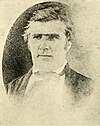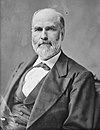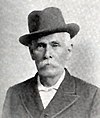North Carolina's 4th congressional district: Difference between revisions
No edit summary |
No edit summary |
||
| Line 16: | Line 16: | ||
| population = 761,039<ref name="auto"/> |
| population = 761,039<ref name="auto"/> |
||
| population year = 2022 |
| population year = 2022 |
||
| median income = $74,019<ref name="auto">{{Cite web |url=https://www.census.gov/mycd/?st=37&cd=04|title=My Congressional District|publisher=U.S. Census Bureau Center for New Media |
| median income = $74,019<ref name="auto">{{Cite web |url=https://www.census.gov/mycd/?st=37&cd=04|title=My Congressional District|publisher=U.S. Census Bureau Center for New Media and Promotion (CNMP)|website=census.gov}}</ref> |
||
| percent white = 52.6 |
| percent white = 52.6 |
||
| percent black = 27.4 |
| percent black = 27.4 |
||
Revision as of 22:10, 12 January 2024
| North Carolina's 4th congressional district | |
|---|---|
Interactive map of district boundaries since January 3, 2023 | |
| Representative | |
| Population (2022) | 761,039[1] |
| Median household income | $74,019[1] |
| Ethnicity |
|
| Cook PVI | D+16[2] |
| Created | 1789 |
North Carolina's 4th congressional district is located in the central region of the state. The district includes all of Alamance County, Durham County, Granville County, Orange County, and Person County, as well as a portion of Caswell County. With a Cook Partisan Voting Index rating of D+16, it is the most Democratic district in North Carolina.[2]
Until 2023, the district was represented by 11-term Congressman David Price, a former political science professor at Duke who was first elected in 1986, ousting one-term Republican incumbent Bill Cobey.[3] Price was reelected in 1988, 1990, and 1992, but he was defeated in his bid for a fifth term in 1994 by Republican Fred Heineman, the Raleigh Police Chief, in a generally bad year for Democrats in North Carolina. Price came back to defeat Heineman in a rematch in 1996, and has been reelected each time since then by large margins, usually with more than 60% of the vote. In 2020, Price received 67% of the votes (332,421 votes) to defeat Republican challenger Robert Thomas, who received 33% (161,298 votes).[4]
Before court mandated redistricting in 2016, according to research by Christopher Ingraham of The Washington Post, the district was the third most gerrymandered Congressional district in North Carolina and seventh most gerrymandered district in the United States.[5] In contrast, its predecessor was the most regularly drawn of the state's 13 districts.
The fourth district is currently represented by Valerie Foushee.
History
From 2003 to 2013, the district contained most of the area commonly known as The Triangle. It included all of Durham and Orange counties, part of Wake County and a small section of Chatham County. The 4th district picked up the most Republican areas of Wake County, such as Apex, Cary, and much of North Raleigh in order to help make the neighboring 13th and 2nd districts more Democratic. For instance, Barack Obama defeated John McCain in the Wake County portion of the district in 2008 by 51–48%, a difference of less than 8,000 votes in between the two candidates.[6] In contrast, Obama won Wake County overall by a much greater margin of 56–43%, and Obama swept the 4th district as a whole by 63–36%. The Republican influence in the district's Wake County portion was more than canceled out by the two Democratic strongholds of Orange and Durham counties, where Obama received 72% and 76%, respectively, his two best counties in the entire state. The 4th district had a Cook PVI of D+8, which made it the most Democratic white-majority district in the entire South outside of South Florida and Northern Virginia.
The district became even more heavily Democratic as a result of 2012 redistricting, in which the more Republican areas of western and southern Wake County were removed, along with northern Orange County and most of its share of Durham County. They were replaced by heavily Democratic portions of Alamance, Cumberland, Harnett and Lee counties. Additionally, the district was pushed further into Raleigh. Like its predecessor, the district is one of the few Southern districts with a significant concentration of progressive-minded white voters—similar to areas around Atlanta, Houston, Charlotte, Nashville, Memphis and Austin. The presence of the University of North Carolina-Chapel Hill and Duke University, as well as large African-American populations in Durham and Raleigh help contribute to the liberal nature of the 4th district.
Before court mandated redistricting in 2016, the district was just barely contiguous; the northern and southern portions were connected by a barely-discernible strip of land along the Lee/Harnett line. Court-mandated redistricting in 2019 again reconfigured the district, returning large portions of Durham County and removing large portions of Raleigh and Cary, North Carolina.[7]
On February 23, 2022, the North Carolina Supreme Court approved a new map which changed the 4th district boundaries to include Alamance and Person while removing Franklin and the parts of Chatham, Vance and Wake.[8]
Counties
Counties in the 2023–2025 congressional district map:
Recent election results from statewide races
| Year | Office | Results |
|---|---|---|
| 2000 | President | Gore 52-47% |
| 2004 | President | Kerry 61–38% |
| 2008 | President | Obama 72–27% |
| 2012 | President | Obama 71–28% |
| 2016 | President | Clinton 68–27% |
| 2020 | President | Biden 66–32% |
List of members representing the district
Past election results
2002
| Party | Candidate | Votes | % | |
|---|---|---|---|---|
| Democratic | David Price (incumbent) | 132,185 | 61.18 | |
| Republican | Tuan A. Nguyen | 78,095 | 36.15 | |
| Libertarian | Ken Nelson | 5,766 | 2.67 | |
| Total votes | 216,046 | 100 | ||
| Democratic hold | ||||
2004
| Party | Candidate | Votes | % | |
|---|---|---|---|---|
| Democratic | David Price (incumbent) | 217,441 | 64.1 | |
| Republican | Todd A. Batchelor | 121,717 | 35.88 | |
| N/A | Maximilian Longley | 76 | 0.02 | |
| Total votes | 339,234 | 100 | ||
| Democratic hold | ||||
2006
| Party | Candidate | Votes | % | |
|---|---|---|---|---|
| Democratic | David Price (incumbent) | 127,340 | 64.99 | |
| Republican | Steve Acuff | 68,599 | 35.01 | |
| Total votes | 195,939 | 100 | ||
| Democratic hold | ||||
2008
| Party | Candidate | Votes | % | |
|---|---|---|---|---|
| Democratic | David Price (incumbent) | 265,751 | 63.32 | |
| Republican | William (B.J.) Lawson | 153,947 | 36.68 | |
| Total votes | 419,698 | 100 | ||
| Democratic hold | ||||
2010
| Party | Candidate | Votes | % | |
|---|---|---|---|---|
| Democratic | David Price (incumbent) | 155,384 | 57.16 | |
| Republican | William (B.J.) Lawson | 116,448 | 42.84 | |
| Total votes | 271,832 | 100 | ||
| Democratic hold | ||||
2012
| Party | Candidate | Votes | % | |
|---|---|---|---|---|
| Democratic | David Price (incumbent) | 259,534 | 74.47 | |
| Republican | Tim D'Annunzio | 88,951 | 25.53 | |
| Total votes | 348,485 | 100 | ||
| Democratic hold | ||||
2014
| Party | Candidate | Votes | % | |
|---|---|---|---|---|
| Democratic | David Price (incumbent) | 169,946 | 74.75 | |
| Republican | Paul Wright | 57,416 | 25.25 | |
| Total votes | 227,362 | 100 | ||
| Democratic hold | ||||
2016
| Party | Candidate | Votes | % | |
|---|---|---|---|---|
| Democratic | David Price (incumbent) | 279,380 | 68.22 | |
| Republican | Sue Googe | 130,161 | 31.78 | |
| Total votes | 409,541 | 100 | ||
| Democratic hold | ||||
2018
| Party | Candidate | Votes | % | |
|---|---|---|---|---|
| Democratic | David Price (incumbent) | 247,067 | 72.4 | |
| Republican | Steve Loor | 82,052 | 24.0 | |
| Libertarian | Barbara Howe | 12,284 | 3.6 | |
| Total votes | 341,403 | 100 | ||
| Democratic hold | ||||
2020
| Party | Candidate | Votes | % | |
|---|---|---|---|---|
| Democratic | David Price (incumbent) | 332,421 | 67.3 | |
| Republican | Robert Thomas | 161,298 | 32.7 | |
| Total votes | 493,719 | 100 | ||
| Democratic hold | ||||
2022
| Party | Candidate | Votes | % | |
|---|---|---|---|---|
| Democratic | Valerie Foushee | 194,983 | 66.91% | |
| Republican | Courtney Geels | 96,442 | 33.09% | |
| Total votes | 291,425 | 100.00% | ||
| Democratic hold | ||||
See also
References
- ^ a b "My Congressional District". census.gov. U.S. Census Bureau Center for New Media and Promotion (CNMP).
- ^ a b "2022 Cook PVI: District Map and List". Cook Political Report. Retrieved January 10, 2023.
- ^ "Our Campaigns - Candidate - David E. Price". www.ourcampaigns.com.
- ^ "11/03/2020 UNOFFICIAL LOCAL ELECTION RESULTS - STATEWIDE". NCSBE.
- ^ Ingraham, Christopher. "America's most gerrymandered congressional districts". Retrieved March 14, 2019.
- ^ "north carolina hard totals". Google Docs. Retrieved March 14, 2019.
- ^ "Legislative and Congressional Redistricting". North Carolina General Assembly. Retrieved January 4, 2021.
- ^ Doule, Steve (February 23, 2022). "Check out new election maps: NC Supreme Court rejects appeals, approves special masters' districts". WGHP. Retrieved March 21, 2022.
- ^ a b c d "Data Courtesy of Jeffrey B. Lewis, Brandon DeVine, and Lincoln Pritcher with Kenneth C. Martis". United States Congressional District Shapefiles.
- ^ "11/05/2002 Official General Election Results - Statewide". North Carolina State Board of Elections. November 15, 2002. Retrieved December 25, 2017.
- ^ "11/02/2004 Official General Election Results - Statewide". North Carolina State Board of Elections. November 12, 2004. Retrieved December 25, 2017.
- ^ "11/07/2006 Official General Election Results - Statewide". North Carolina State Board of Elections. November 17, 2006. Retrieved December 25, 2017.
- ^ "11/04/2008 Official General Election Results - Statewide". North Carolina State Board of Elections. November 14, 2008. Retrieved December 25, 2017.
- ^ "11/02/2010 Official General Election Results - Statewide". North Carolina State Board of Elections. November 12, 2010. Retrieved December 25, 2017.
- ^ "11/06/2012 Official General Election Results - Statewide". North Carolina State Board of Elections. November 16, 2012. Retrieved December 25, 2017.
- ^ "11/04/2014 Official General Election Results - Statewide". North Carolina State Board of Elections. November 25, 2014. Retrieved December 25, 2017.
- ^ "11/08/2016 Official General Election Results - Statewide". North Carolina State Board of Elections. December 13, 2016. Retrieved December 25, 2017.
- ^ "District 4, North Carolina State Board of Elections & Ethics Enforcement". North Carolina State Board of Elections & Ethics Enforcement. Retrieved November 10, 2018.
- ^ "District 4, North Carolina State Board of Elections & Ethics Enforcement". North Carolina State Board of Elections & Ethics Enforcement. Retrieved January 4, 2020.
- ^ "NC SBE Contest Results". er.ncsbe.gov. Retrieved January 2, 2023.
- Martis, Kenneth C. (1989). The Historical Atlas of Political Parties in the United States Congress. New York: Macmillan Publishing Company.
- Martis, Kenneth C. (1982). The Historical Atlas of United States Congressional Districts. New York: Macmillan Publishing Company.
- Congressional Biographical Directory of the United States 1774–present

































